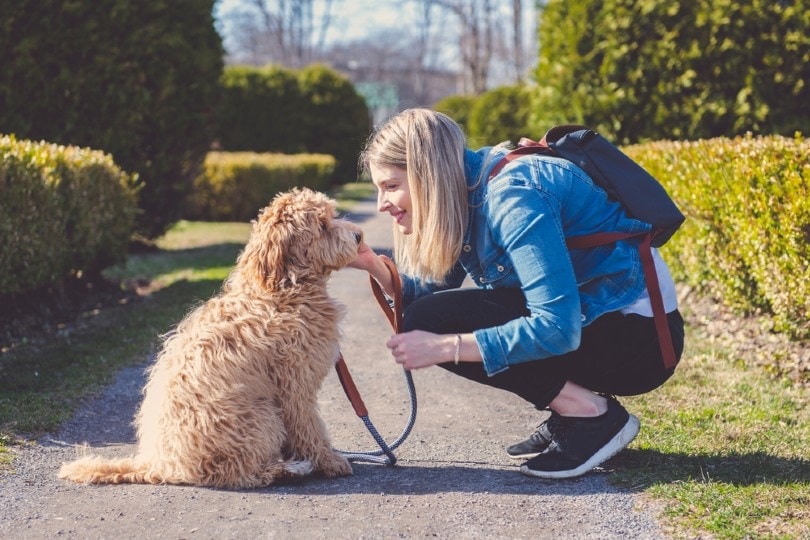How Much Should You Feed a Yorkie? Feeding Chart & Health Tips
Updated on
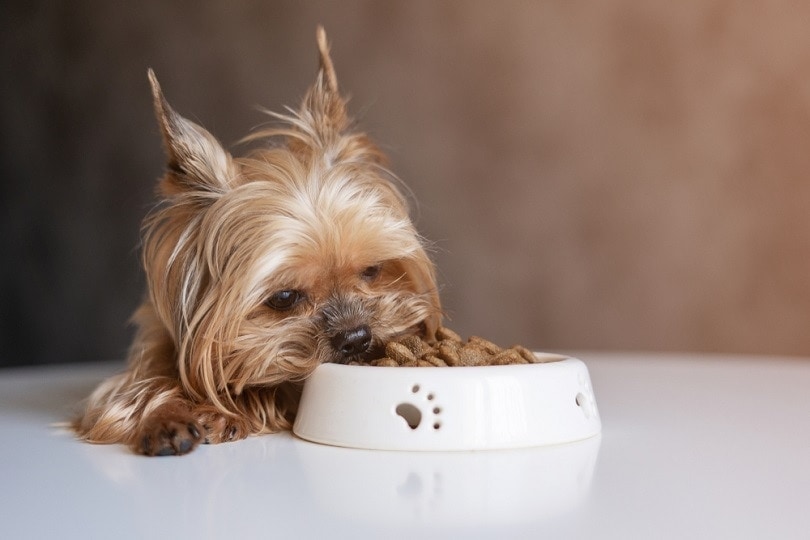
Click to Skip Ahead
Yorkshire Terriers — better known as Yorkies — are tiny little dogs, but that doesn’t mean they aren’t feisty and ferocious. These dogs have big personalities, which is why they’re one of the most popular breeds on the planet.
If you’re not used to owning such a small dog, though, you may struggle with knowing just how much to feed them. After all, you don’t want them to go hungry, but being overweight is terrible for them. It’s hard to give them just the right amount of food.
Fortunately, there are clear guidelines when it comes to feeding a Yorkie puppy, depending on how old the puppy is. Below, we’ll walk you through the proper amount to give your puppy according to their age.
Feeding Chart
Important Note: The amount of calories each juvenile dog needs for healthy growth and development depends on many factors, including their age, breed, and activity level. These charts are general guidelines for healthy young dogs, but we recommend confirming them with your vet.
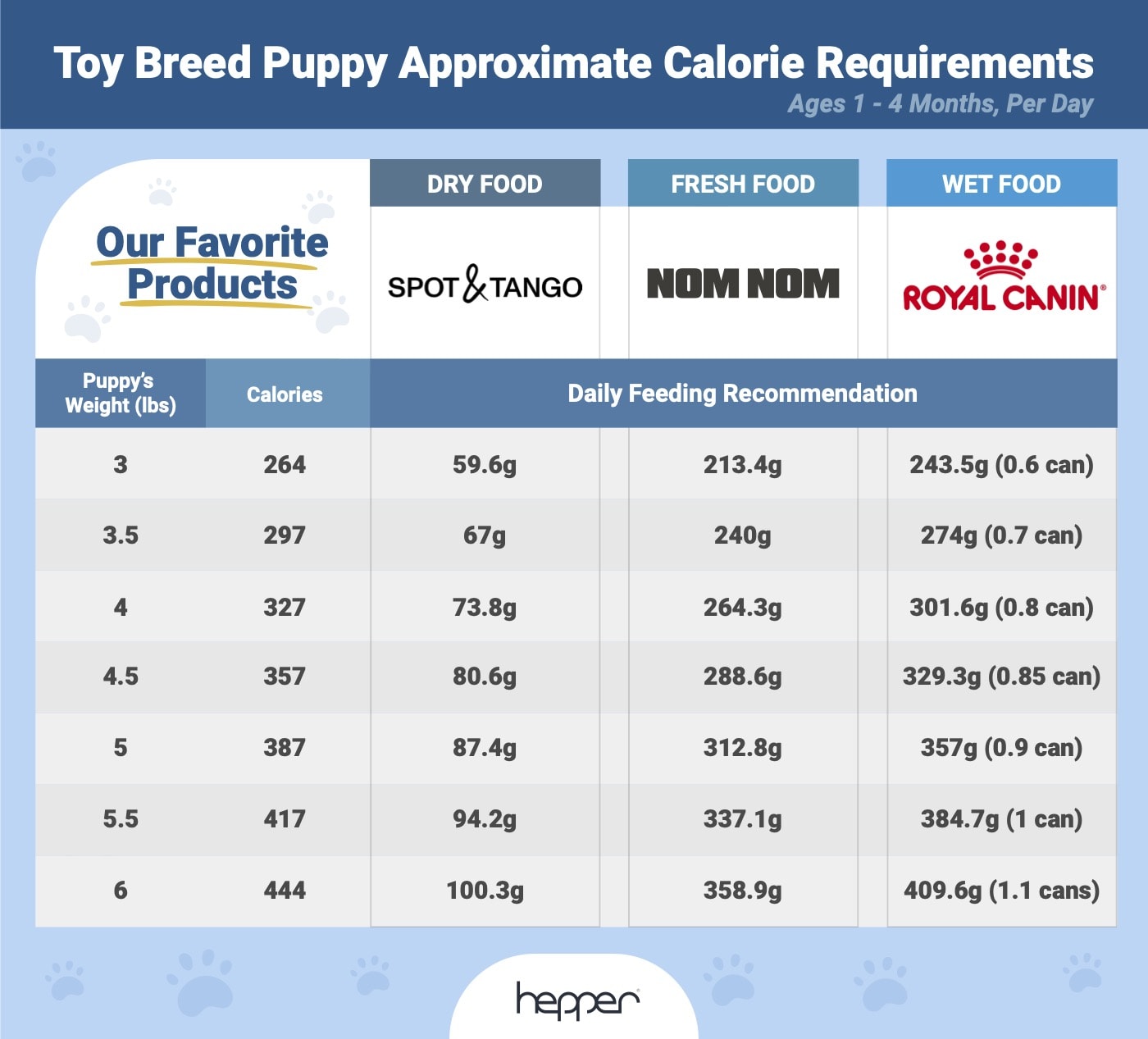
You can also complement this guide by using our dog food calculator here:
The exact amount of calories an individual animal needs to maintain a healthy weight is variable and influenced by many factors including genetics, age, breed, and activity level. This tool is meant to be used only as a guideline for healthy individuals and does not substitute veterinary advice
What to Feed My Yorkie Puppy
Yorkies should be nursing until they’re 8 weeks old, at which point, you can switch them to solid food. You can switch them to wet food, dry kibble, or a mixture of the two.
Keep in mind that they still have their puppy teeth, so some kibbles will be too hard for them to crunch. However, wet food is extremely calorie-dense, so your dog may put on too much weight too quickly if fed canned food exclusively. Also, wet foods won’t clean a dog’s teeth like kibble will.
We recommend a mixture of the two — but only if the kibble is specifically designed for toy breed puppies. We recommend Wellness CORE Small Breed Puppy, as it has all the nutrition that a young dog needs while still being gentle enough for little Yorkies to tolerate.
You may also consider feeding your puppy a raw diet that you make yourself, but be careful if you go this route. It’s easy to overlook key nutrients when designing your own food, so ask your vet for help before making any decisions.
Keep your dog on a puppy formula until they’re a year old or whenever your vet recommends switching them to adult food. At that point, you’ll need to find an appropriate adult kibble for them; Taste of the Wild Appalachian Valley Small Breed is an excellent choice.
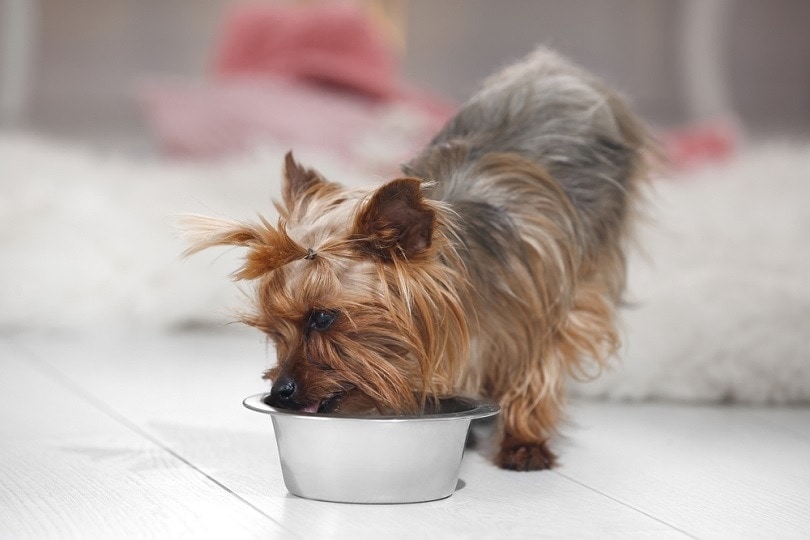
Avoiding Underfeeding & Overfeeding
If you feed your Yorkie an appropriate amount, you shouldn’t have any issue with them being overweight or underweight. However, if you don’t know what you’re looking for, it’s easy to worry that your dog isn’t developing properly.
The best way to tell if your Yorkie is an appropriate weight is by looking at their waist and ribs. The waist should curve inward subtly as you look at their ribcage and move down. If the dog isn’t an appropriate weight, this curve will be extremely sharp.
If the dog is too skinny, they’ll have virtually no body fat. Their stomach will tuck sharply into the ribs, and every rib will be visible.
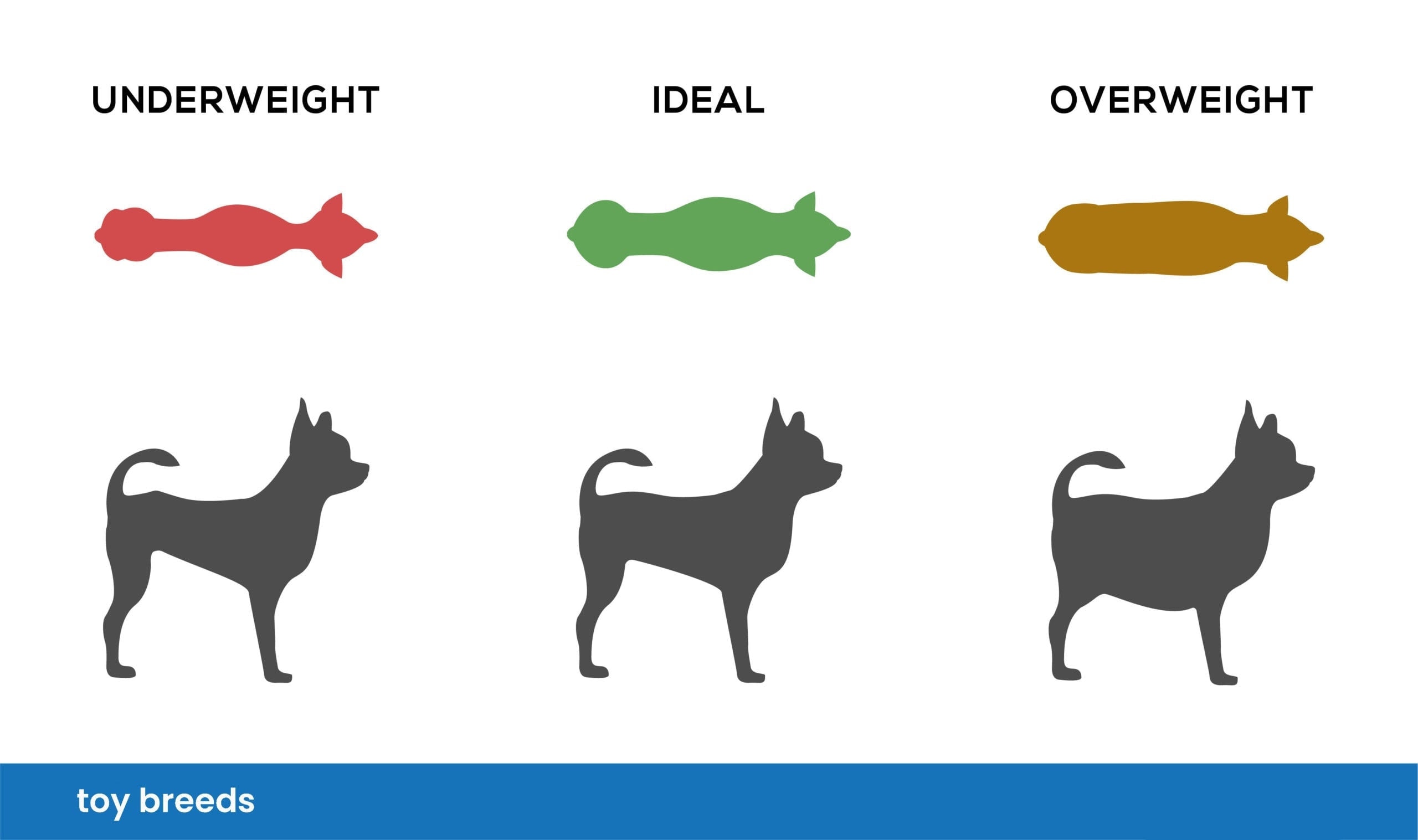
That said, you should be able to at least feel every rib if you put your hands on the sides of their body. If the dog is overweight, you’ll really have to dig your fingers into their flesh to feel those bones.
An overweight dog will need to have their portion sizes reduced, while an underweight dog is a cause for more concern. You can try simply feeding them more, but if they still can’t keep on weight, you’ll likely need to take them to a vet. They may have parasites or a disease like a parvovirus.
When to Switch From Puppy to Adult Food
You should transition your dog to adult food around 1 year of age or whenever you’re instructed to by your vet. Small breeds like Yorkies develop faster than larger dogs, so you might be able to make the switch a few months early.
Your dog’s activity level will factor into the decision as well. If your pup prefers lazing around to being up and active, you’ll want to get them off a high-calorie puppy formula sooner rather than later. Otherwise, they’ll likely pack on unnecessary pounds.
Don’t just make the switch overnight, though. It needs to be a gradual process. Start by replacing a quarter of their puppy kibble with the adult recipe. After a few days, you can make it a 50/50 mix; then, a few days later, move on to 75% adult kibble.
The whole process should take 2 weeks or so. If you rush it, you run the risk of causing an upset stomach, so unless you want to deal with diarrhea, you should take your time.

Why Won’t My Yorkie Puppy Eat?
There are few things as stressful as dealing with a puppy that won’t eat. It’s amazing how devoted we can become to these creatures in such a short period of time, so when their health is seemingly at risk, it’s extremely concerning.
Unfortunately, there are myriad reasons that a puppy might turn their nose up at food, and it isn’t easy to pinpoint a single one.
You can start by offering them different food. If they eat it readily, then it’s probably a case of them simply not liking their puppy food. If they won’t eat other foods (including high-value human snacks), then you might have a bigger problem on your hands.
Stress may be an issue as well. If you’ve made big changes to your routine lately, it may just take a few more days for them to become acclimated. However, if they’re being left alone more than usual, they may be lonely, so spending more time with them might do the trick.
If that doesn’t work, then you need to take your puppy to the vet.
- Digestive parasites
- Digestive infection
- Bowel obstruction
- Pain
- Organ dysfunction
- Respiratory infection
How Much to Feed an Adult Yorkie
It can take a little more effort to decide what to feed an adult Yorkie than it does a puppy, as there are many variables that could affect the recommended serving size.
Below, we’ll cover a few common factors that influence the proper feeding amount, so you can be sure to give your dog the most appropriate portion size possible. However, take these recommendations with a grain of salt. The information will vary depending on the type of food you feed them, so follow the manufacturer’s guidelines or your vet’s advice.

Males vs. Females
There isn’t much difference between the two sexes, so they should both be fed similar amounts.
- Generally speaking, adult Yorkies should eat 1/4 to 1/2 cups of kibble per day, spaced out between two meals. This is true regardless of whether you have a male or a female.
Highly Active vs. Sedentary Dogs
It’s unlikely that any Yorkie will be active enough to require a significant increase in portion size over the recommended amount. However, a sedentary Yorkie may require a reduction in portion size in order to prevent obesity.
If your dog isn’t gaining or losing weight, though, there’s little reason to change how much you feed them.
- If your dog is extremely sedentary, you should only feed them 1/4 cup of kibble twice a day. Active dogs should be fed the full 1/2 cup serving size twice a day.
Spayed or Neutered
In many breeds, getting spayed or neutered has a sizable effect on the dog’s metabolism. Fixed dogs require fewer calories than unaltered animals, as they won’t be expending as much energy on their sexual maturation.
However, the effect isn’t nearly as pronounced in Yorkies, given their small size. As a result, you should feed a fixed Yorkie the same amount that you’d serve an unaltered animal, provided that they’re not gaining or losing weight.
- Spayed or neutered Yorkies should be fed the full 1/2 cup serving twice a day, provided that there aren’t other issues that would necessitate changing their portion sizes.
Pregnant Dogs
This is one situation that will require making changes to your feeding practices. Pregnant dogs require quite a few more calories than normal, and you want to make sure your dog is getting the proper nutrition. You may even want to switch her back to a puppy formula, as it’s more calorie-dense than adult recipes (do it slowly, though).
Pregnant Yorkies need more calories than normal. They should be allowed to free-feed, so be sure to keep their bowl full; it’s recommended that you replace the food regularly rather than merely topping it off.
Yorkie Feeding Guide for Seniors
Older Yorkies need to be watched closely to ensure that they don’t pack on extra weight. They’re likely to be a bit more sedentary than they used to be, and even if they’re not, their metabolism will likely slow considerably. However, it’s not just the calorie count that you need to be aware of. Older Yorkies have certain nutritional needs that they lacked when they were puppies.
Specifically, you want to give them a food that’s high in glucosamine for joint health, as well as loaded with fiber to keep them regular. You want a food that has at least 5% fiber, if possible.
Consider the density of the kibble as well. Many senior dogs have dental issues or a lack of teeth that makes it difficult for them to crunch certain kibbles. You’ll want to find something that’s soft enough for them to chew, or you could possibly switch to a wet diet. Just be careful if you switch to canned food, as they tend to be denser in calories than kibble.
One of the best senior foods we’ve found is Merrick Senior Chicken & Sweet Potato Recipe. It’s a little low in fiber, but it’s loaded with high-quality ingredients like chicken, salmon meal, and flaxseed.
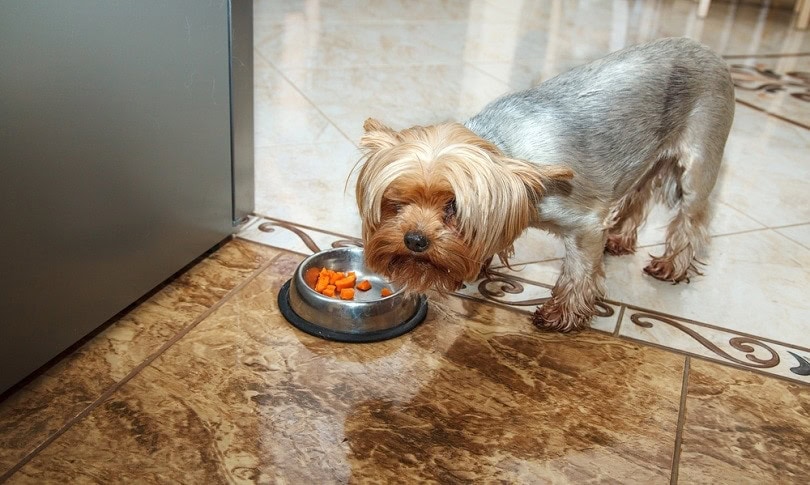
Why Is My Yorkie Always Hungry?
Yorkies are tiny dogs but they often have mighty appetites. It can often seem like they’re starving to death, no matter how much you feed them.
As long as your dog isn’t suffering from any health issues and they aren’t underweight, you should ignore their pleas for extra food. They’ll surely eat anything that you offer them, but that will make them fat, which is terrible for their health.
Continue to feed them as you have, and be sparing with the treats and table scraps. As long as what you’re doing is working, keep it up, but listen to your vet if they have any suggestions.
Unless your dog is pregnant, you shouldn’t allow them to free-feed. Yorkies aren’t good at regulating their calorie intake, so giving them a constant supply of food is just asking for trouble. Instead, offer them strictly portion-controlled meals at regular intervals.
If your dog is scarfing their food down as soon as it’s offered, you may want to invest in a slow feeder bowl. These bowls have special ridges and grooves that make it hard for your dog to pick up food, slowing down the rate at which they eat.

What Foods Are Bad for Yorkies?
Yorkies will eat just about anything, so you need to be careful about what you offer them. There are certain foods that should be avoided at all costs.
Naturally, this means foods that are toxic to dogs, like grapes, raisins, chocolate, onions, garlic, avocadoes, and sweeteners like xylitol. You should also keep any alcohol, caffeine, or marijuana stored where they can’t reach it.
When looking for food for your Yorkie, avoid anything that’s filled with cheap fillers like wheat, corn, or soy. Animal by-products are a bad idea as well, as they’re made using low-grade cuts of meat that you don’t want your dog eating.
Some Yorkies have food allergies, so if your dog is suffering from digestive issues, their diet may be to blame. The most common culprits are foods like chicken, eggs, and dairy, so start by cutting those out of your dog’s diet one by one. If that doesn’t work, ask your vet for help.
Given their small size, Yorkies shouldn’t be allowed to have any food that may pose a choking hazard. Find a kibble that’s small enough for them to eat comfortably, and break up any treats or scraps that you serve them.
 Conclusion
Conclusion
Yorkies don’t eat much, which makes them inexpensive pets to own. However, that also means that what you feed them — and how much — takes on outsized importance. They need a healthy, well-balanced diet, or else they could become obese or suffer from a variety of other ailments.
You’ll need to change the type and amount of food that you feed your Yorkie as they grow, but as long as you give them suitable food in proper portion size, you should have a healthy, happy dog on your hands.
Featured Image Credit: Valerie Nik, Shutterstock



 Conclusion
Conclusion

